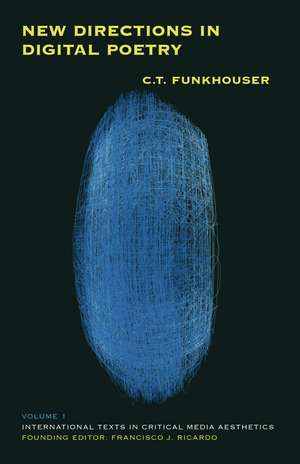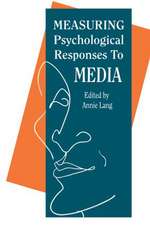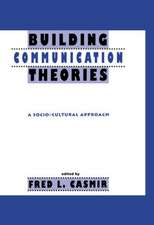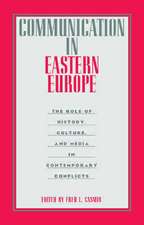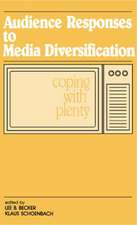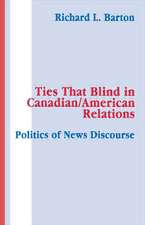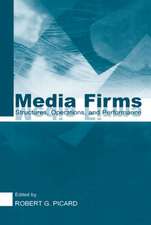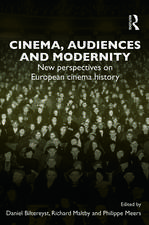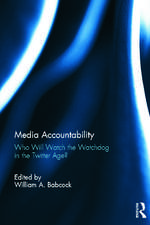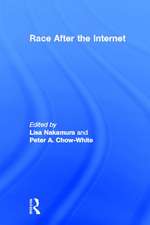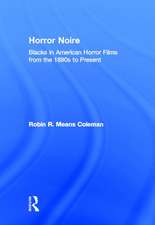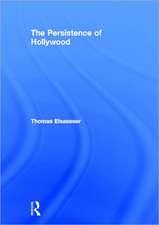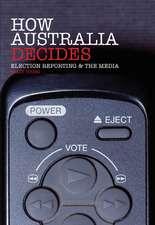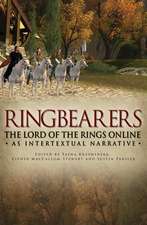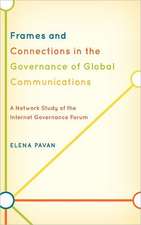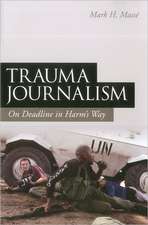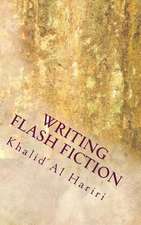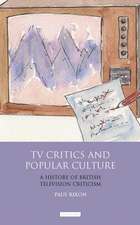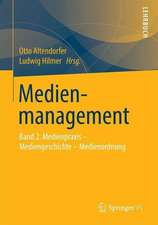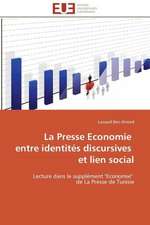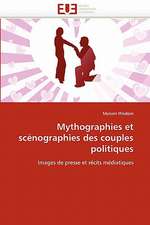New Directions in Digital Poetry: International Texts in Critical Media Aesthetics
Autor C.T. Funkhouseren Limba Engleză Paperback – 21 mar 2012
| Toate formatele și edițiile | Preț | Express |
|---|---|---|
| Paperback (1) | 259.79 lei 6-8 săpt. | |
| Bloomsbury Publishing – 21 mar 2012 | 259.79 lei 6-8 săpt. | |
| Hardback (1) | 833.64 lei 6-8 săpt. | |
| Bloomsbury Publishing – 21 mar 2012 | 833.64 lei 6-8 săpt. |
Preț: 259.79 lei
Preț vechi: 297.31 lei
-13% Nou
Puncte Express: 390
Preț estimativ în valută:
49.71€ • 52.01$ • 41.30£
49.71€ • 52.01$ • 41.30£
Carte tipărită la comandă
Livrare economică 03-17 aprilie
Preluare comenzi: 021 569.72.76
Specificații
ISBN-13: 9781441115911
ISBN-10: 1441115919
Pagini: 344
Ilustrații: 40
Dimensiuni: 138 x 216 x 23 mm
Greutate: 0.48 kg
Ediția:New.
Editura: Bloomsbury Publishing
Colecția Continuum
Seria International Texts in Critical Media Aesthetics
Locul publicării:New York, United States
ISBN-10: 1441115919
Pagini: 344
Ilustrații: 40
Dimensiuni: 138 x 216 x 23 mm
Greutate: 0.48 kg
Ediția:New.
Editura: Bloomsbury Publishing
Colecția Continuum
Seria International Texts in Critical Media Aesthetics
Locul publicării:New York, United States
Caracteristici
Provides a series of detailedcase studies delineating the transformational, multi-faceted, resonant aspects ofpoetic textuality.
Notă biografică
C.T. Funkhouser is an Associate Professor at New Jersey Institute of Technology. He is the author of Prehistoric Digital Poetry: An Archaeology of Forms, 1959-1995.
Cuprins
Introduction
Francisco J. Ricardo Chapter One
Poetic Moldings on the Web
Chapter Two
Encounters with a Digital Poem
Chapter Three
Case Studies 1: continuity & diversity in online works
Chapter Four
Case Studies 2: digital poetry early in the 21st century
Chapter Five
Case Studies 3: poems of the Web, by the Web, for the Web
Chapter Six
In stages, on stages: attentions in digital poetry
Epilogue
Acknowledgements
Bibliography
Index
Francisco J. Ricardo Chapter One
Poetic Moldings on the Web
Chapter Two
Encounters with a Digital Poem
Chapter Three
Case Studies 1: continuity & diversity in online works
Chapter Four
Case Studies 2: digital poetry early in the 21st century
Chapter Five
Case Studies 3: poems of the Web, by the Web, for the Web
Chapter Six
In stages, on stages: attentions in digital poetry
Epilogue
Acknowledgements
Bibliography
Index
Recenzii
"Once again, Funkhouser is way ahead of the rest. No one else pays such close attention to digital poetry, and no one else attends to the payoff: a deep understanding of the viewing and reading experience, backed by detailed and illuminating research into the technical and compositional process. The future of poetry never looked so bright." --Sandy Baldwin, the Center for Literary Computing, West Virginia University
The greatest strength of Chris Funkhouser's New Directions in Digital Poetry is that the author is willing to engage with diverse forms and modalities of digital poetry on their own terms. Funkhouser is neither bending these text-machines into a predetermined theoretical paradigm nor falling into the trap of reading them simply as devices. While taking into account their computational properties and networked context, Funkhouser never strays from a focused and intelligent reading of the works he surveys as poems. This is a greater accomplishment than one might assume: many of the works he encounters here are combinatory multimedia hybrids that challenge readers to interpret different signals and poetic structures than they might be accustomed to. And yet, as Funkhouser's readings so aptly attest, even among cognitive dissonance, meaning can found here, and wonder, and nearly infinite possibility. I look forward to using this book in electronic literature courses I teach. Not only does New Directions in Digital Poetry offer an exemplary heuristic model of how to read digital poetry, it is also an excellent companion to the two volumes of the Electronic Literature Collection where many of the works Funkhouser engages can be found online and freely accessible. --Scott Rettberg, University of Bergen Electronic Literature Research Group
I discovered just how narrow and outdated my understanding of digital poetry really was...Funkhouser introduces digital poetry through attentive and engaging studies of twenty-four works created individually or collaboratively by sixteen digital poets, and in the process makes it very clear how much this ever-evolving genre has to offer to someone willing to take it on...a book of minute particulars, providing a wealth of close readings of digital poems which are crucial for educating a new audience in how to read, view, or interact with these works...What C. T. Funkhouser has given us is in New Directions in Digital Poetry is a detailed and thoughtfully drawn map of this terrain and a guidebook for all who seek the strange pleasures of this digital art form.
Through a combination of technical and literary analysis, C.T. Funkhouser's close readings of electronic literature contain an original contribution to the canon of digital literary studies. His analysis of the signifying strategies and reading possibilities of programmed works is carefully nuanced and deeply attentive to their intermedia textualities and procedural dynamics, and reflects his long involvement in the field as artist, critic, and historian. His book is a timely addition to a growing body of close readings of digital literature.
The greatest strength of Chris Funkhouser's New Directions in Digital Poetry is that the author is willing to engage with diverse forms and modalities of digital poetry on their own terms. Funkhouser is neither bending these text-machines into a predetermined theoretical paradigm nor falling into the trap of reading them simply as devices. While taking into account their computational properties and networked context, Funkhouser never strays from a focused and intelligent reading of the works he surveys as poems. This is a greater accomplishment than one might assume: many of the works he encounters here are combinatory multimedia hybrids that challenge readers to interpret different signals and poetic structures than they might be accustomed to. And yet, as Funkhouser's readings so aptly attest, even among cognitive dissonance, meaning can found here, and wonder, and nearly infinite possibility. I look forward to using this book in electronic literature courses I teach. Not only does New Directions in Digital Poetry offer an exemplary heuristic model of how to read digital poetry, it is also an excellent companion to the two volumes of the Electronic Literature Collection where many of the works Funkhouser engages can be found online and freely accessible. --Scott Rettberg, University of Bergen Electronic Literature Research Group
I discovered just how narrow and outdated my understanding of digital poetry really was...Funkhouser introduces digital poetry through attentive and engaging studies of twenty-four works created individually or collaboratively by sixteen digital poets, and in the process makes it very clear how much this ever-evolving genre has to offer to someone willing to take it on...a book of minute particulars, providing a wealth of close readings of digital poems which are crucial for educating a new audience in how to read, view, or interact with these works...What C. T. Funkhouser has given us is in New Directions in Digital Poetry is a detailed and thoughtfully drawn map of this terrain and a guidebook for all who seek the strange pleasures of this digital art form.
Through a combination of technical and literary analysis, C.T. Funkhouser's close readings of electronic literature contain an original contribution to the canon of digital literary studies. His analysis of the signifying strategies and reading possibilities of programmed works is carefully nuanced and deeply attentive to their intermedia textualities and procedural dynamics, and reflects his long involvement in the field as artist, critic, and historian. His book is a timely addition to a growing body of close readings of digital literature.
